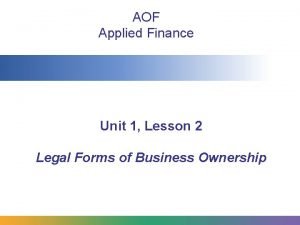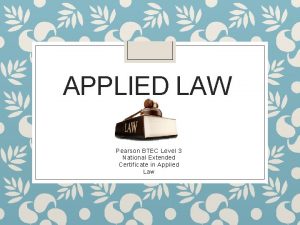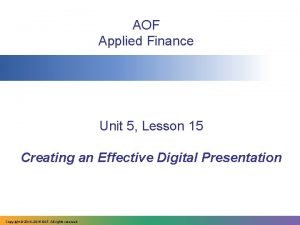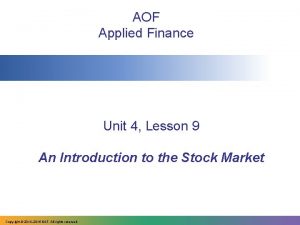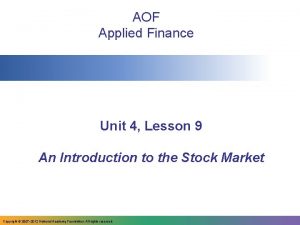AOF Applied Finance Unit 4 Lesson 9 An









- Slides: 9

AOF Applied Finance Unit 4, Lesson 9 An Introduction to the Stock Market Copyright © 2007– 2012 National Academy Foundation. All rights reserved.

Stocks represent part ownership of a company Once a company goes public, all ownership is in the form of shares of stock. • The original owners hold some of it. • Some may go to top executives. • Some may be offered to employees for purchase. • The rest may be offered to the public. If a company decided to have 10 shares of stock and you bought one, you would own one-tenth of the company. What percentage of its stock would the company need to hold to keep control?

The stock market has “stores” around the globe • Stocks are sold at stock exchanges all over the world. • A company decides where it wants to be listed to sell its stock. • Stock prices are displayed on a board and constantly updated. • Each stock has a distinctive abbreviation. The New York Stock Exchange, above; the Bourse (stock exchange) in Copenhagen, Denmark, below.

How do you know how the market is performing? • Market indexes measure how a segment of the market is doing. For example: • The Dow Jones Industrial Average lists 30 major companies. • The Morgan Stanley Biotech Index lists 36 American biotech firms. • A rising market is a “bull If the Dow were at 100 and it market. ” fell 12 points, what would the new Dow index be? • A falling one is a “bear market. ”

Why would a company sell off part of itself as stock? • It needs cash for capital investment. • It doesn’t want to repay a loan. • Expansion would mean more sales and higher profits. • Higher profits would boost its stock price and company value.

Why would someone buy part of a company? • Investors want their money to earn more money. • Over time, stocks give greater payback than bonds, savings, and other investments. • Shareholders get a say in how the company is managed. If you owned a stock that fell in price, would you sell it or hold on to it? Why?

How do you join the club? • Stock sales are arranged through stockbrokers, who charge a commission. • The more service you get, the higher the fees the broker charges. • You can research new stocks by reading the company prospectus. Would you prefer to do your own research or rely on a broker? Front page of a prospectus

What affects stock prices? Investors look at: • How well the company is doing • Price-earnings ratio • Capitalization • Supply and demand— of a stock or a commodity • Current events— politics, the economy, natural disasters, terrorist attacks How would hurricane damage affect the stock of a construction firm?

Stocks are just one part of a balanced financial plan The stock market isn’t for the timid. • Growth potential comes with risk. • Remember that your investments are not insured. • Diversify your portfolio (have a mix of investment types). • Have clear goals geared to your stage of life. How well do you think you could tolerate a loss of value in your stock investments?

